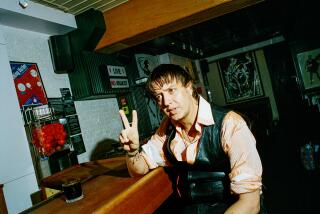Brian Eno, R&D; Entrepreneur of New Music
- Share via
Sitting poolside at a Santa Monica hotel, Brian Eno cocked his head to hear the barely perceptible music that wafted gently from nearby speakers.
“What’s interesting about this kind of music is not the music, but that people are using music in ways they hadn’t before, and that composers are writing it--though not always good ones,” said the small, balding Englishman, in town to oversee the launching of his new Warner Bros.-distributed record label, Opal.
You’d think that Eno, who pioneered the environmental use of music with such so-called ambient experiments as 1979’s “Music for Airports,” would be insulted by the music playing by the pool--the kind that has been called, often pejoratively, New Age. But that’s not the case at all.
“It’s a whole new niche of music,” he said. “And I’m proud to have been partially responsible for it.”
Developing niches is Eno’s specialty. There’s hardly an area of popular music and culture in which his influence has not been felt to some extent.
His post-Dada approach to electronics and pop music as a member of Roxy Music in the early ‘70s and on his own mid-’70s solo albums helped set the table for punk and new-wave music and for current styles of electro-pop. As a record producer he’s been central to the development of Talking Heads and U2.
His ambient music not only led to New Age, but influenced film scores as well. He has been a pioneer in the fields of video and environmental sculpture--his video installation “The Latest Flame” will open Thursday at the Santa Monica Museum of Art (2437 Main St., (213) 451-5850) and continue through Oct 1.
Other events scheduled to mark his label’s debut are radio appearances by electronic musician-composer Harold Budd (tonight), Eno’s pianist brother Roger (Thursday), New York band Hugo Largo (Friday) and Eno (Monday), all at 8 p.m. on KCRW-FM (89.9), a lecture by Eno Thursday at the Japan America Theatre and a concert featuring Opal artists at the same theater on Friday.
Despite his impressive resume, Eno himself remains a largely unknown figure to pop fans. And that suits him just fine.
“If you think about it in industrial terms, some people are the big manufacturers, like Fleetwood Mac or Pink Floyd are the General Motors of the pop music world,” Eno said.
“I’m more the research and development department, or--what do they call it?--sprout industry, like a fledgling Silicon Valley-type industry. I like being that, I’m good at that and I’m not good at being consistent. So I’ve moved around a lot, which has been confusing to people. I do my best work when I encounter a situation freshly, so when it’s not fresh I invent a new situation for myself.
“Opal is sort of another part of the R&D; department. It’s a place that doesn’t have a definition really, so it can handle a large collection of things and hope that they refer to each other and support each other.”
Opal, he said, will release whatever interests him, whether it be experimental or ambient music, or--as will be the case soon--an album of Armenian music originally released by the Soviet Union’s Melodiya label, with which Opal has a reciprocal licensing arrangement.
Among other upcoming Opal projects will be Eno’s first album in several years--though he won’t say whether it will be his first pop-structured release since 1978’s “Before and After Science.”
“It will either be extremely dissonant, but not unpleasantly so, or extremely harmonic, but not pleasantly so,” he said cryptically. The fact that his first vocal performance in a decade--a version of the old William Bell soul tune “You Don’t Miss Your Water”--was just released on the “Married to the Mob” sound-track album should not necessarily be taken as a clue, he added.
Whatever it ends up being, though, his only wish is that it will make at least a few ripples in popular culture that he can sit back and watch.
“One of the first things I ever wanted to be was an inventor,” he said. “Usually it ends up that the inventor makes little things like pinch rollers in a tape recorder. I like making little pieces. But I do like the fact that some of that comes through on the how many millions of albums U2 sells.”
More to Read
The biggest entertainment stories
Get our big stories about Hollywood, film, television, music, arts, culture and more right in your inbox as soon as they publish.
You may occasionally receive promotional content from the Los Angeles Times.










